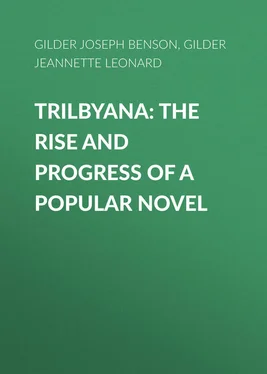* * *
The New York Sun printed a letter, not long ago, in which the drawings were declared to be anachronistic. "Why," it was asked, "should Mr. du Maurier deny to his characters the crinolines, waterfalls, surtouts, cravats, chignons, peg-top trousers and hoop-skirts of the early sixties, and make them, despite Taffy's whiskers, of the monde of to-day? Is it that his artistic instincts have reverted to that fine school of old masters who delighted to portray, saving Taffy's grace, Hector fighting in the armor of the Black Prince, or turned out Madonnas by the score in Margaret of Anjou skirts?"
* * *
In "Trilby" every stroke of pen or pencil seems to be significant. Is there special meaning in the fact that, in the dainty tail-piece, one glass in the spectacles appears to be heavily shaded, while the other is clear? Is Mr. du Maurier, like so many literary people, afflicted with partial loss of sight or other visual difficulty?
Amherst College Library. W. I. Fletcher.
[Unhappily he is, and has been for many years. It is only with the greatest difficulty that he is able to work with either pen or pencil.]
Mr. Paul M. Potter's dramatization of "Trilby" was produced by Mr. A. M. Palmer's company at the Boston Museum on Monday, 4 March, 1895, and achieved so great a success that several companies were immediately put upon the road to play it throughout the country. Its first production in New York, with the original cast, occurred at the Garden Theatre, on April 15. Hundreds of people were turned away from the door for want of room to accommodate them; and an offer was received from Mr. Beerbohm Tree, the eminent English actor, for the privilege of producing the play in England, where he himself wished to impersonate Svengali. It would be a pity if the Lyceum company did not secure the English rights; for Mr. Irving would make an inimitable Svengali, and Ellen Terry would be Trilby without trying.
As nobody has ever succeeded, or is likely to succeed, in really dramatizing a novel, it is not surprising that the stage version of "Trilby" should prove in some respects unsatisfactory. It might be thought that the book would lend itself readily to dramatic treatment; but a little consideration will show that it offers peculiar difficulties to the playwright, inasmuch as its chief charm is one of manner, which cannot be transferred to the stage, while its story, although it contains some striking situations, such as Trilby's collapse upon the death of Svengali, consists chiefly of a series of episodes, largely independent of each other and strung together very loosely. All things considered, Mr. Potter ought not, perhaps, to be held to too strict an account for the liberties he has taken with the text and some of the personages, but he has certainly lowered the tone of the work, and been guilty of various crudities of construction. There is some excuse for his employment of Svengali as the evil influence which wrecks the happiness of Little Billee and Trilby, but he leaves nothing of the author's original intention, and infinitely belittles the character of the girl, when he attributes her flight from her lover to mesmeric suggestion, instead of her own noble and unselfish devotion. In many other similar ways the spiritual side of the book suffers at his hands. His persistent references to Trilby's posing for the figure, his selection of that particular incident for her first introduction, and the joking references to it which he puts into the mouths of other personages, are in bad taste, while his travesty of the character of Dr. Bagot is entirely without justification. Mrs. Bagot he treats with more consideration, but he reduces her to the level of the dullest stage conventionality. Trilby herself preserves a good many of her characteristics, but is degraded even more than in the book by her subserviency to Svengali.
The play is in four acts, and the whole story up to the flight of Trilby is compressed into the first two. This feat is accomplished with no small ingenuity, but at great cost of probability. In this brief space Trilby is wooed and won, Svengali asserts his mesmeric power, the marriage of Little Billee is arranged and interrupted by the arrival of his mother, and an elopement is planned and frustrated. In the third act Trilby is to sing in the Cirque des Bashibazouck, and all the characters reassemble as if by magic in the foyer of that temple of art, which is abandoned of all other persons for their sole benefit. The proceedings which are supposed to occur in this retired spot are intrinsically absurd, but they are effective enough from a scenic and theatrical point of view, and were accepted by the audience, on the first night, as eminently natural and satisfactory. They culminate in the ghastly death of Svengali and the restoration of Trilby in a dazed and exhausted condition to the three faithful friends. In the fourth act there is another reunion of characters, and Trilby, who has agreed once more to marry Little Billee, and is supposed to be on the road to recovery, dies suddenly, upon the unexpected apparition of Svengali's photograph.
Конец ознакомительного фрагмента.
Текст предоставлен ООО «ЛитРес».
Прочитайте эту книгу целиком, купив полную легальную версию на ЛитРес.
Безопасно оплатить книгу можно банковской картой Visa, MasterCard, Maestro, со счета мобильного телефона, с платежного терминала, в салоне МТС или Связной, через PayPal, WebMoney, Яндекс.Деньги, QIWI Кошелек, бонусными картами или другим удобным Вам способом.












